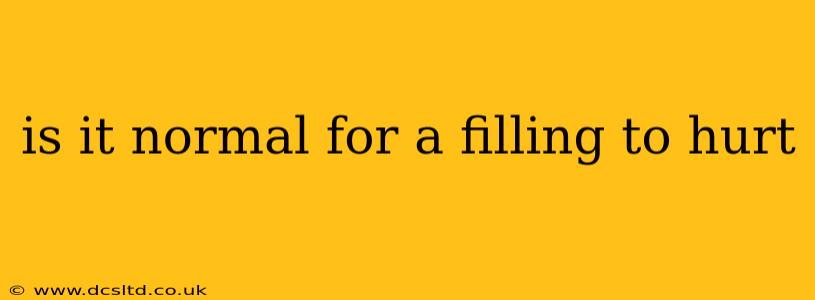Is It Normal for a Filling to Hurt?
It's completely understandable to wonder if pain after a dental filling is normal. While many people experience no discomfort at all, some degree of sensitivity is common in the days following the procedure. However, the type and duration of pain can help determine if it's a normal post-filling reaction or something that needs attention from your dentist.
What are the common reasons for post-filling pain?
Several factors can contribute to post-filling discomfort:
-
Irritation of the tooth: The process of placing a filling involves some degree of manipulation and drilling of the tooth. This can cause temporary irritation and sensitivity to temperature changes (hot and cold) or pressure. This is usually mild and resolves within a few days.
-
Inflammation: Minor inflammation of the gum tissue around the filling site is possible. This can lead to tenderness and slight discomfort.
-
High bite: Occasionally, the filling may be slightly too high, causing your teeth to bite together unevenly. This can lead to pain, pressure, and even jaw discomfort.
-
Sensitivity to pressure: The newly placed filling may be temporarily sensitive to pressure, especially during chewing.
-
Infection: Though less common, infection is possible if bacteria enter the tooth during the filling process. This would typically be accompanied by more severe pain, swelling, and potentially fever.
How long is it normal for a filling to hurt?
Mild sensitivity, such as increased sensitivity to hot or cold, is usually considered normal for a few days to a week after a filling. However, if the pain is severe, persistent (lasting more than a week), or accompanied by other symptoms (swelling, fever, throbbing pain), it's crucial to contact your dentist immediately.
What if the pain is severe or doesn't go away?
Severe or persistent pain after a filling is not normal and requires immediate attention. This could indicate a number of problems, including:
- A cracked tooth: The filling may have been placed on a tooth that had a pre-existing crack, which may have worsened during the procedure.
- Pulpitis (inflammation of the pulp): This involves the nerve of the tooth and can cause significant pain.
- Infection: An infection around the filling could be the cause of severe pain.
- Incorrect placement of the filling: The filling may not have been placed properly, leading to discomfort and potential further damage.
What should I do if my filling hurts?
- Contact your dentist: This is the most important step. They can assess the situation and determine the cause of your pain.
- Over-the-counter pain relievers: You can use pain relievers like ibuprofen or acetaminophen to manage mild discomfort.
- Avoid biting down hard on the affected tooth: Give it time to heal.
Can I eat normally after a filling?
You should avoid extremely hot or cold foods and drinks, and hard or chewy foods initially, as these might increase sensitivity. Gradually return to your normal diet once the initial sensitivity subsides.
What types of fillings are there, and do they have different pain levels after placement?
Different filling materials exist (composite resin, amalgam, porcelain), and their pain profiles after placement are relatively similar. However, the size and location of the filling could influence the post-procedure sensitivity regardless of the material used.
Remember, the best course of action is always to contact your dentist if you experience any significant or persistent discomfort after a filling. They can accurately diagnose the issue and provide the necessary treatment.
